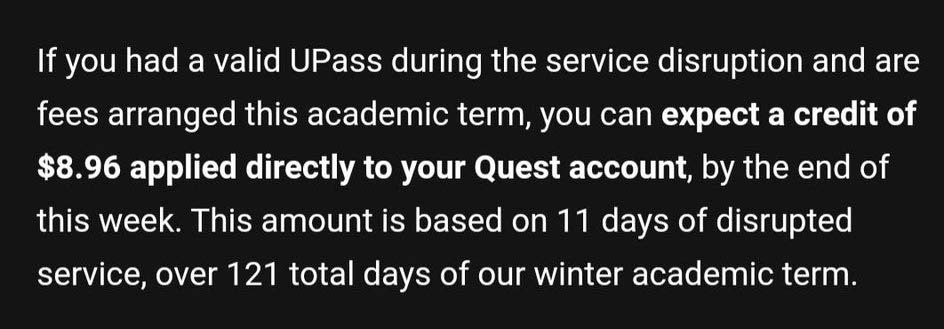Students received an email from WUSA on Mar. 2 regarding a reimbursement for the GRT strike. Students can expect a refund of $8.96 in their Quest account.
“We were in an unfortunate position this time. I don’t think we were well prepared to address the transit disruption”, Seneca Velling, Vice President, Operations and Finance, WUSA, said.
Velling said that WUSA came to the conclusion that $8.96 is the appropriate amount, as the base fee for GRT transit is $98.60 for the total days of winter semester. That is 121 days, including non-regular days like exams and orientations.
But the base fee reflected in our tuition fee bill is $101.07, which is $1.02 more than the base fee reported by Velling. He clarified that this is the borne administrative overhead that is used for electronic payments, cutting cheques, or funding the audits and insurance.
He also informed Imprint that UW students pay approximately $200 per year, compared to $90 per month charged for adult passes. It is due to this large discount on everyday price that students will receive a small amount per month for reimbursement in the event of disruption.
Two students contacted by Imprint, who wish to remain anonymous, reflected that this amount is too small in relation to the inconvenience caused by the strike.
“I think [WUSA] would be better off giving nothing than an amount that meagre, given how inconvenient the strike was. The way I see it, it is kind of disrespectful,” said a student who uses the GRT transit on a day-to-day basis.
“I appreciate the refund by WUSA, but the amount was very menial in comparison to the amount I paid out of my pocket for Uber”, said a student who was negatively affected by the GRT strike.
While the students on academic terms received their refund automatically, students on co-op have to claim their refunds in person. As explained by Velling, co-op students are not registered as payers on Quest, making them absent from the financial systems.
“We are not trying to make the process difficult, the challenge we are facing is [because] we cannot directly refund the people on co-op,” said Velling. He also mentioned that if students visited their family or friends in Waterloo during the days of disruption, they are qualified for a refund.
Students with a permanent or temporary disability can ask for a larger refund if they ran out of pocket during the disruption. Even if students were not registered with health services at the time of the strike, they can still register now and receive a refund.
Velling did admit that WUSA was not prepared for the strike since this is the first time that a strike did happen.
WUSA said it’s working to bring ‘Transit Disruption Liability Reverse.’ The plan would put a little money aside annually for for reimbursements.































